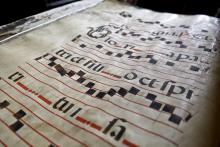 Music at Cambridge – a brief history
Music at Cambridge – a brief history
Music has a long history at Cambridge. Indeed, in 1464 the world’s first firmly-authenticated Bachelor of Music degree was awarded at Cambridge to one Henry Abyngdon, Master of the Children of the Chapel Royal to Edward IV. Over the intervening centuries celebrated musicians such as William Boyce, William Sterndale Bennett, Charles Villiers Stanford, Ralph Vaughan Williams, Arthur Bliss, Alexander Goehr, Robin Holloway, Judith Weir and Thomas Adès have studied or taught at Cambridge. In 1843 the Cambridge University Music Society (CUMS) was established, and gradually built a splendid tradition of concert-giving; half a century later came the Cambridge University Music Club (CUMC), founded for the promotion of chamber music. Cambridge has also been well-known in recent years for the performances and broadcasts of its chapel choirs, amongst whom that of King’s College (among others under Arthur Henry Mann, Boris Ord, David Willcocks and Stephen Cleobury) has gained the widest popular recognition.
Recognising the importance of music as an academic study, the University established the Faculty of Music in 1947 to teach the newly created Music Tripos, and since then the number of music students has increased enormously, musical activity of every kind has greatly intensified at both university and college level, and the tradition of distinguished musicological research instituted in the early years of the twentieth century by E. J. Dent has flourished. The Faculty now occupies the purpose-built University Music School and Concert Hall, designed by Sir Leslie Martin and built in the mid-1970s.
Over recent decades many of the most significant figures in British music have emerged from Cambridge: the composers mentioned above, performers such as Joanna MacGregor, Robert Tear, Thomas Trotter, Roger Vignoles and David Waterman, and conductors such as Andrew Davis, Mark Elder, John Eliot Gardiner and Christopher Hogwood. During the same period the Faculty’s intellectual bounds have moved outwards from historical musicology to include music analysis, ethnomusicology and music cognition. The Cambridge Music Faculty is, in short, committed to providing the highest quality of musical education, to conducting research at the forefront of contemporary scholarship, and is proud to build on the great foundations laid in earlier times.
You can find further details about the history of music at Cambridge in Martin Cullingford’s article ‘Music past’, from Cambridge Alumni Magazine.



